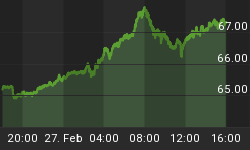China wants to rein in inflation, or so it says. It also wants 10% growth per year as far as the eye can see. It does not want to float the Yuan, and it does not want to hike interest rates. Nor does China want to do anything about credit gone amuck.
In other words, China wants the proverbial "free lunch". Given there is no free lunch, China is overheating. Please consider China bank loans near 500 billion yuan in January
Chinese banks continued their lending frenzy in the beginning of the year, doling out 500 billion yuan ($75.6 billion) in new loans in the first week of January alone, putting fresh pressure on the central bank to tighten policy to put a lid on inflation.
The loan figure includes about 210 billion yuan extended by the "Big Four" state lenders, sources with direct knowledge of the figures told Reuters on Wednesday.
The overall lending figure would roughly equal the new loans extended during all of December. New lending in December reached 480.7 billion yuan, meaning China overshot the government's target of keeping bank loans to 7.5 trillion yuan in 2010.
Banks lent 7.95 trillion yuan ($1.2 trillion) in 2010, overshooting Beijing's target and highlighting the need for more decisive policy tightening. In the past, China used loan quotas to keep a handle on lending. This year, the central bank has pledged to refine that system with regular calibrations of reserve requirements.
Rampant, Understated Inflation
7.5 trillion yuan is about 1.14 trillion US dollars. You are not going to have that kind of credit expansion, while building entirely vacant cities in the process.
China's official inflation is 5%. Unofficially, estimates are 10% as noted in China's Foreign Exchange Reserves Jump by Record $199 Billion; Cost Push Inflation from China? Don't Count On It!
However, that does not count increases in home prices. It is an enormous mistake to ignore property bubbles, as the US found out, and as China, Australia, Canada, and the UK are going to find out.
China's Vacant Cities
In case you missed it, please consider Amazing Satellite Images Of The Ghost Cities Of China on the Business Insider.
"There's city after city full of empty streets and vast government buildings, some in the most inhospitable locations. It is the modern equivalent of building pyramids. With 20 new cities being built every year, we hope to be able to expand our list going forward."
More Vacant China City Stories
- Implosion of the China "Fabric City" Frenzy
- 10 Signs of Speculative Mania in China
- Email from a Chinese on China's Real Estate Bubble
China property bubble will overheat until it implodes. In the meantime, regardless of what China reports on the CPI, inflation remains a huge problem. Once again, those looking for inflation can find it in China, not the US, where consumer credit is contracting.















